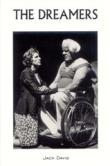 5900909558839502222.jpg
5900909558839502222.jpg
 5900909558839502222.jpg
5900909558839502222.jpg
'With humane irony the Western Australian poet, Jack Davis gives a painful insight into the process of colonisation and the transformation of his people.'
'The Dreamers is the story of a country-town family and old Uncle Worru, who in his dying days, recedes from urban hopelessness to the life and language of the Nyoongah spirit which in him has survived 'civilisation'.' (Currency Press website)
Director: Andrew Ross.
Cast: Jack Davis, Lynette Narkle, Maxine Narkle, John Pell, Michael Fuller, Trevor Parfitt, Luke Fuller, Shane McIntyre, Wayne Bynder and Michael T. Fuller.
Music: Richard Walley (Didgeridoo)
Choreography: Richard Walley
Lighting and Set Design: Keith Edmundson
'History of Australian Aboriginal’s colonisation, exploitation and assimilation has had ill effects on the performance of Indigenous gender relations, challenged the heteronormative conception of gender and directed Aboriginal people into shaping marginalised type of masculinities and femininities. With this background, this study attempts to depict the trajectory of shift in gender enactment of Aboriginal men and women in the pre and post contact era. The purpose is to account for the gender enactment of Indigenous people of Australia as has been veridically represented in Davis’s The Dreamers in the decades of 1970s and 1980s. Zooming in on such issues as unemployment, imprisonment, alcohol consumption, and acts of violence, among others, this paper argues that Indigenous characters in the play show signs of crisis of masculinity; in this regard, Tim Edwards’s notion of the crisis of masculinity has been employed. As the counterbalance of Indigenous emasculated men, however, the masculine performative role of Indigenous women has been highlighted. Raising these assumptions, we touch upon Judith Butler’s notion of performativity and gender identity, at the heart of theoretical framework, and prove the authority of our discussion regarding Indigenous ambivalent figures in the light of Indigenous critics such as Brendan Hokowhitu, Kim Anderson and Shino Konishi, to name but a few.' (Publication abstract)
 The Dreamers : The Aboriginal Experience
Frank Bladwell
(interviewer),
Sydney
:
Sound Information
,
1984
Z1604376
1984
selected work
drama
interview
The Dreamers : The Aboriginal Experience
Frank Bladwell
(interviewer),
Sydney
:
Sound Information
,
1984
Z1604376
1984
selected work
drama
interview